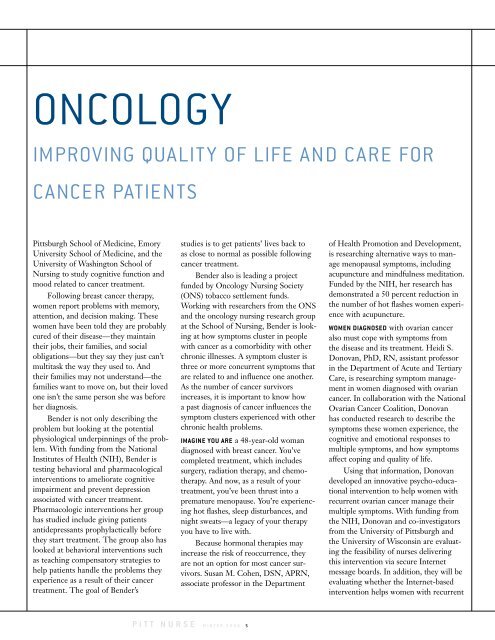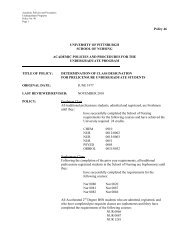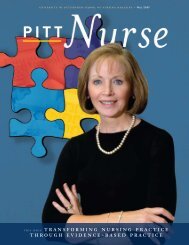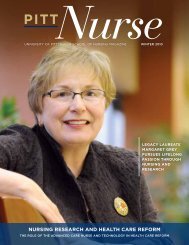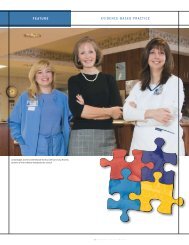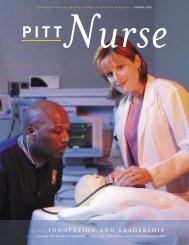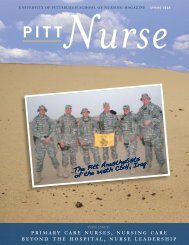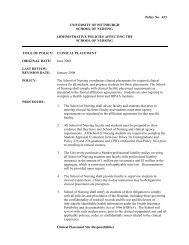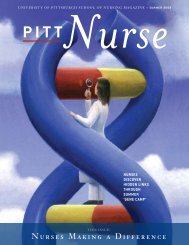complete issue - School of Nursing - University of Pittsburgh
complete issue - School of Nursing - University of Pittsburgh
complete issue - School of Nursing - University of Pittsburgh
Create successful ePaper yourself
Turn your PDF publications into a flip-book with our unique Google optimized e-Paper software.
ONCOLOGYImproving Quality <strong>of</strong> Life and Care forCancer Patients<strong>Pittsburgh</strong> <strong>School</strong> <strong>of</strong> Medicine, Emory<strong>University</strong> <strong>School</strong> <strong>of</strong> Medicine, and the<strong>University</strong> <strong>of</strong> Washington <strong>School</strong> <strong>of</strong><strong>Nursing</strong> to study cognitive function andmood related to cancer treatment.Following breast cancer therapy,women report problems with memory,attention, and decision making. Thesewomen have been told they are probablycured <strong>of</strong> their disease— they maintaintheir jobs, their families, and socialobligations —but they say they just can’tmultitask the way they used to. Andtheir families may not understand—thefamilies want to move on, but their lovedone isn’t the same person she was beforeher diagnosis.Bender is not only describing theproblem but looking at the potentialphysiological underpinnings <strong>of</strong> the problem.With funding from the NationalInstitutes <strong>of</strong> Health (NIH), Bender istesting behavioral and pharmacologicalinterventions to ameliorate cognitiveimpairment and prevent depressionassociated with cancer treatment.Pharmacologic interventions her grouphas studied include giving patientsantidepressants prophylactically beforethey start treatment. The group also haslooked at behavioral interventions suchas teaching compensatory strategies tohelp patients handle the problems theyexperience as a result <strong>of</strong> their cancertreatment. The goal <strong>of</strong> Bender’sstudies is to get patients’ lives back toas close to normal as possible followingcancer treatment.Bender also is leading a projectfunded by Oncology <strong>Nursing</strong> Society(ONS) tobacco settlement funds.Working with researchers from the ONSand the oncology nursing research groupat the <strong>School</strong> <strong>of</strong> <strong>Nursing</strong>, Bender is lookingat how symptoms cluster in peoplewith cancer as a comorbidity with otherchronic illnesses. A symptom cluster isthree or more concurrent symptoms thatare related to and influence one another.As the number <strong>of</strong> cancer survivorsincreases, it is important to know howa past diagnosis <strong>of</strong> cancer influences thesymptom clusters experienced with otherchronic health problems.Imagine you are a 48-year-old womandiagnosed with breast cancer. You’ve<strong>complete</strong>d treatment, which includessurgery, radiation therapy, and chemotherapy.And now, as a result <strong>of</strong> yourtreatment, you’ve been thrust into apremature menopause. You’re experiencinghot flashes, sleep disturbances, andnight sweats—a legacy <strong>of</strong> your therapyyou have to live with.Because hormonal therapies mayincrease the risk <strong>of</strong> reoccurrence, theyare not an option for most cancer survivors.Susan M. Cohen, DSN, APRN,associate pr<strong>of</strong>essor in the Department<strong>of</strong> Health Promotion and Development,is researching alternative ways to managemenopausal symptoms, includingacupuncture and mindfulness meditation.Funded by the NIH, her research hasdemonstrated a 50 percent reduction inthe number <strong>of</strong> hot flashes women experiencewith acupuncture.Women diagnosed with ovarian canceralso must cope with symptoms fromthe disease and its treatment. Heidi S.Donovan, PhD, RN, assistant pr<strong>of</strong>essorin the Department <strong>of</strong> Acute and TertiaryCare, is researching symptom managementin women diagnosed with ovariancancer. In collaboration with the NationalOvarian Cancer Coalition, Donovanhas conducted research to describe thesymptoms these women experience, thecognitive and emotional responses tomultiple symptoms, and how symptomsaffect coping and quality <strong>of</strong> life.Using that information, Donovandeveloped an innovative psycho-educationalintervention to help women withrecurrent ovarian cancer manage theirmultiple symptoms. With funding fromthe NIH, Donovan and co-investigatorsfrom the <strong>University</strong> <strong>of</strong> <strong>Pittsburgh</strong> andthe <strong>University</strong> <strong>of</strong> Wisconsin are evaluatingthe feasibility <strong>of</strong> nurses deliveringthis intervention via secure Internetmessage boards. In addition, they will beevaluating whether the Internet-basedintervention helps women with recurrentp i t t N u r s e W i n t e r 2 0 0 6


